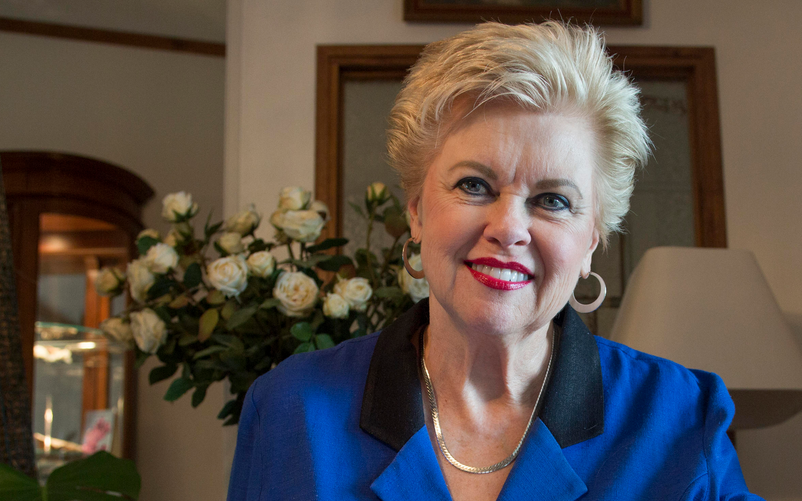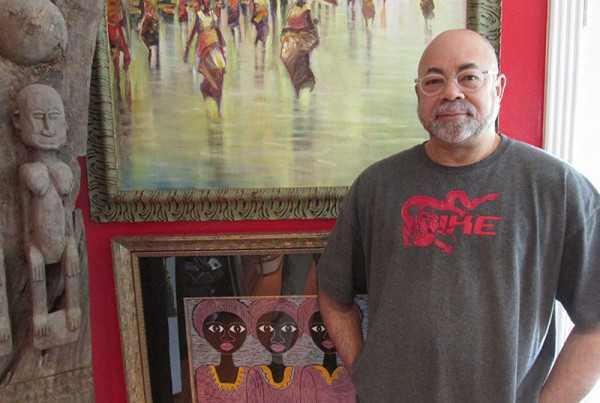This story originally appeared on KUT News.
Attorney Kay Lively doesn’t mind it when dogs bark at her. She visits her clients at home, so barking dogs are just a part of her job.
Lively specializes in estate planning, and she’s 72 years old.
Her client Hank Einck just had surgery, so when Lively pays him a visit, he is dressed in sweats.
Einck will be designated as the executor of his mother’s will, and that’s what Lively is helping him with. Einck’s mother’s death was completely unexpected. At 90, she was still energetic – headed for Alaska this summer. But she had cancer that went undetected until nearly the end of her life.
“Who knew?” Einck says.
He says it’s “gonna be a trying time as executor of the will to try and work with four sisters.”
Lively puts Einck at ease. As they privately go over the terms of the will, Lively explains things twice, three times if needed. Once the paperwork is done, Lively slides Einck’s credit card on her phone (“sign with your finger”), and the session is over. Lively tells Einck that if they need to meet with the sisters, she’d be “more than happy to do it again.”
Back at her home office, Lively tells me she decided to be an attorney when she was in her 50s. It was her fourth career reinvention.
Lively started out as an elementary school teacher. She was married to a pilot. She traveled a lot and went to school in several countries.
“So, I came back and taught gourmet cooking and international foods, French cooking and light cuisine in community college for four years,” she says.
After teaching cooking, Lively ran a bed-and-breakfast.
Then, after 32 years of marriage, she and her husband divorced. That’s when she went to law school. But finding a job afterward proved tough.
“No one came right out and said, ‘we are not going to hire you because of your age,’ but just on paper, they assumed that I was going to be slow, [or] too independent, where they couldn’t control me,” Lively says.
Lively wondered how she could earn an income while putting her knowledge to work. Then she got an idea from seeing how stressed out her own 103-year-old mother became when she had any type of appointment. Her mother, Lively says, fears she’ll forget important paperwork, or that she’ll get lost.
It occurred to Lively that she could cater to elderly clients, like her mother, by taking her meetings with them in their homes.
And she quickly realized that the elderly weren’t the only clients who prefer home appointments.
“Also a lot of young couples, they both work, they have three little kids, so I can come any time that’s convenient for them – including nights and weekends. The kids can play right there. I’m a grandmother, so that doesn’t daunt me in any way,” Lively says.
And, so, Lively found her niche, and her fourth career reinvention became a success: She can pay her bills. She stays active and, through word of mouth, she gets more clients every day.
Unlike Lively, other older people facing a career reinvention may not have found their a-ha moment. And reinvention may seem like a daunting task.
A new Austin non-profit called Austin Up sees this as an opportunity to help. Teresa Ferguson, Austin Up’s director, says she’s recruiting older Austinites to become life coaches for people facing a fork in the road.
“Maybe they want to start a new business – maybe they have an entrepreneurial idea but don’t know the first thing about starting a business,” Ferguson says.
For these folks, a life coach or mentor with a business background could tell them what it takes to run the business they have in mind. If those parameters don’t seem feasible, the life coach could help them look for a different option.
Ferguson says that her father-in-law became a life coach during the last few years of his life, when he was in his 80s, and in fairly poor health.
“But, when he was talking about his career and things he’d learned and passing that on to someone new, all of the health issues seemed to fade into the background,” she says.
Central Texas has one of the fastest growing populations of seniors in the U.S. And as they consider their options — retirement, volunteerism, a new career move — they may take advantage of the opportunity to change careers. Maybe, as Lively did, for the second, or the third — or the fourth — time.















